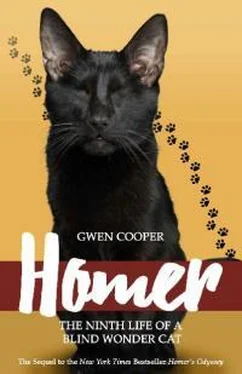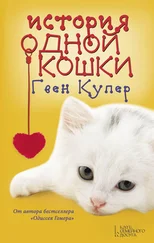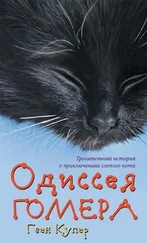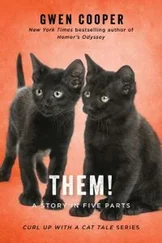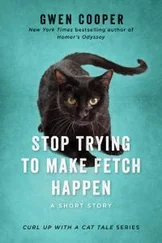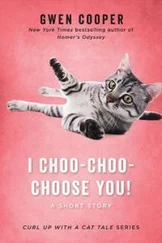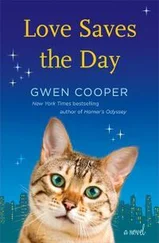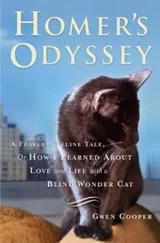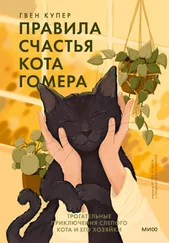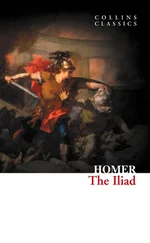The most enduring early image I have of the two of them comes from the evening of their fourth day with us. We’d set them up in our guest bedroom at first, wanting to give them a chance to acclimate, to feel safe in their new space and to get used to things smelling like Homer, while also giving Homer a chance to get used to things—like the t-shirts I let them sleep on and then wore around the house—smelling like them.
On the fourth day, I opened the door to the guest room and let them out into the rest of the apartment for the first time. Clayton, as if shot from a cannon, immediately took off in a quick bunny-hop on his three good legs, down the long hallway and into the living room. Fanny, however, stood anxiously in the doorway to the guest room, crying for her brother to come back. Every few minutes, Clayton would hop back down the hall to where Fanny stood, touching his nose to hers in a reassuring way. Come on! There’s lots of cool stuff to explore out here! But he was too eager to see his new home to remain with her for long, and soon enough he’d scamper away again.
Much of what we came to learn about their personalities was reflected in those few minutes. Fanny was a fawn-like creature—timid at first, easily spooked, but essentially composed of such pure sweetness and affection that it was like having Vashti with us again. It should be noted, however, that in terms of appearance, Fanny was Vashti’s exact inverse. Where Vashti had been a puffy white fluff-ball, Fanny’s black, short-haired body grew long and slender as it took on the contours of adulthood. But she was, in her precisely opposite way, every inch the beauty Vashti had been. I liked to say that Fanny’s face looked as if it had been drawn by Disney Princess animators, perfectly heart-shaped with high cheekbones, a slightly pointed chin, and tip-tilted almond eyes. “You’re so pretty,” Laurence would croon to her when he thought I couldn’t hear. “You’re a pretty, pretty girl.” And, like Vashti before her, Fanny would lean her head into Laurence’s hand and gaze up at him adoringly. Perhaps because Fanny was so Vashti-like in so many of her ways, she and Laurence seemed to understand each other right from the start.
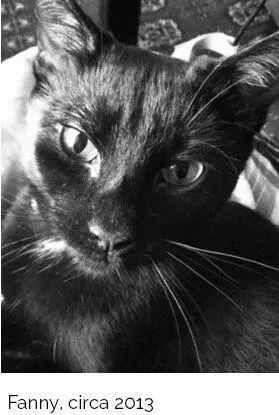
Fanny seemed to understand Homer immediately, too. She was intensely interested in him once she’d made it out of the guest room, but she always approached him gently and respectfully. She would wait until he’d finished cautiously sniffing her and seemed comfortable before attempting to touch her own nose softly to his. If Homer batted a crumpled ball of paper around the living room floor, she would bat it back to him but not otherwise try to intrude on his game until he’d come over and explicitly invited her to play. If Homer curled up on the couch, Fanny would also lie on the couch close enough to make Homer aware that he wasn’t alone, but not so close as to make him feel crowded.
I don’t think she understood that Homer was blind, per se, but she seemed to intuit that he was happiest when he could hear her coming. We’d bought belled breakaway collars for the kittens for just this reason. But Fanny always greeted Homer with a trilling coo, as an additional assurance that her approach was both imminent and friendly. As weeks passed and Homer began to revert to his former playful ways—to once again seek out mischief and fun and food as eagerly as he’d used to—it became clear that this was, at least in part, because Fanny was a balm on the wound that Scarlett’s loss had left on Homer’s spirit.
Clayton, on the other hand, was an intrepid little soul, ready of an instant to bound fearlessly and inquisitively at anything or anyone that crossed his path. Clayton darted down the hallway the day we opened the guest-room door for him, and he never stopped darting, never stopped exploring, never stopped trying to insert himself into everything going on around him. If I’d thought that Homer lacked even a concept of vision because he himself was unable to see, then Clayton seemed to lack even the idea that anyone might not like him, simply because he himself was utterly incapable of disliking anybody or anything.
I’ll admit that Clayton was a puzzle to me for a long time. To say that cats are highly opinionated creatures is almost as reflexively obvious as saying that they have fur and whiskers. Even the most agreeable cat will have certain strong likes and dislikes. Fanny, for example, adored little toy mice and anything with feathers, but wasn’t much interested in any other toys. She was passionate about cat foods made from lamb, duck, or tuna, but couldn’t abide anything containing salmon or beef. As good-natured as Homer was, he hated being picked up, loathed being turned on his back, and would instantly recoil if you laid so much as a finger on his belly.
But Clayton liked everything. Literally everything . He liked crinkle balls and feathered toys and little fake mice and the plastic rings from water jugs and matchbooks and eyeglass cases and takeout menus and anything else small or portable enough for him to carry off in his mouth. He would eat anything you put in front of him. Dry or moist, regardless of flavor or texture—he ate everything and ate it all with equal gusto. You could pick him up, flip him over, rub his tummy, handle him however you liked, and he would nuzzle your hand and ask for more. One afternoon he sat in a chair with Laurence’s visiting ten-year-old nephew, who (only for not knowing any better) spent nearly half an hour rubbing Clayton’s fur the wrong way, while Clayton closed his eyes in a drowsy half-sleep, entirely unruffled.
Clayton liked everybody who came to our home and bunny-hopped out to greet them as fast as his three legs could carry him. He had a thick, club-like tail that swung out like a rudder at skewed angles behind him as he ran, most likely to compensate for some of the balance he lacked. When he wasn’t running, however, his tail seemed stuck permanently in a happy, upward thrust, guaranteeing anyone who approached a friendly—a downright enthusiastic—reception.
Clayton even liked the vet. He liked the vet! A little cut at the bottom of his bad leg became infected and wouldn’t heal, requiring the removal of that leg months ahead of our original schedule. There were a number of vet visits leading up to the surgery—and then the surgery itself—and Clayton not only didn’t struggle or complain, he actually seemed to enjoy himself. When the vet pried back Clayton’s lips to examine his gums and teeth, Clayton purred ecstatically. When the doctor stuck a needle into him to draw blood, Clayton butted his forehead playfully into the crook of the doctor’s elbow. When he poked gingerly at the bottom of Clayton’s infected half-leg—which, surely, must have been at least a little painful—Clayton flipped onto his back and bonked his whole head affectionately against the doctor while licking his hand. I couldn’t help but feel somewhat vindicated at entering the same animal hospital where Homer had always caused such a ruckus with a good patient for a change.
But still…I wondered about things.
Fanny, as she grew, began to develop an adult cat’s more complex vocal patterns—perhaps not as varied as Homer’s, but deeper and more mature sounding than when she’d been only a few weeks old. Clayton, however, still had a very young kitten’s undifferentiated, high-pitched squeak. His meow didn’t even have an “ow” at the end. “ MEEEEEEEEeeee, ” he would say, starting out loud but trailing off as his breath ran out. “ MEEEEEEEEeeee, ” he said when I walked in the door, and, “ MEEEEEEEEeeee, ” he said when he wanted his food, and, “ MEEEEEEEEeeee, ” running to greet some new person, and, “ MEEEEEEEEeeee, ” when struggling for a plaything that was out of his reach. I joked that when the doctors had removed his bad leg, they’d taken away his “ow.”
Читать дальше
